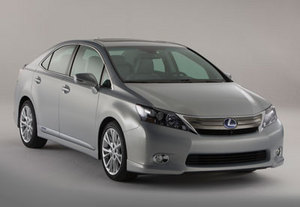2010 Lexus HS 250h Hybrid Review: Engine, Features, Performance, and Pricing
The 2010 Lexus HS 250h will be the brand’s first dedicated hybrid sedan when it reaches showrooms in the fall of 2009. Lexus’s three gas-electric hybrid vehicles currently on sale were originally developed as gas-engine models, then converted or updated for hybrid operation.The HS 250h, based closely on the familiar Toyota Prius, is a hybrid vehicle exclusively, no gas-engine-only version is available. Think of the HS 250h as an upscale Prius with Lexus-style amenities and dealership experience and you won’t be far off the mark.
The HS 250h has similar exterior dimensions to the Prius, on an
identical 106.3-inch wheelbase. Whether the two cars share an
underlying platform or foundation we don’t know. The HS 250h certainly
looks different than the Prius: more stylized, perhaps, with a formal
rear deck and trunk rather than a hatchback. And Lexus’s figures
confirm what an educated eye might guess. With a drag coefficient of
0.27, the HS 250h is slightly less slippery in the air than the Prius
(0.25 Cd). That means that, other things equal, the Lexus will deliver
slightly poorer fuel economy than Toyota’s Prius in exchange for
flashier exterior design.
Like the Prius, the HS 250h will run on its electric motor whenever
travel speed, conditions or driving demands allow. The gasoline engine
will charge the battery pack and provide extra power for maximum
acceleration or high-speed travel, switching off and on automatically
whenever the car stops or demands full power.
The HS 250h engine is larger than that in the 2010 Prius (1.8 liters),
and it’s Lexus’s first four-cylinder to date. This 2.4-liter inline-4
operates on something engineers call the Atkinson-cycle, which tends to
improve fuel efficiency at the expense of peak power. The company
claims that this new engine was developed with an emphasis on noise,
vibration and harshness control, with premium features such as
piston-cooling oil jets and balance shafts that counter vibration
generated by the pistons’ movement in the cylinders. We expect that
means smooth and quiet.
Lexus hasn’t released horsepower or torque ratings for the HS 250h gas
engine, but the company says that the engine and electric motor will
deliver combined peak horsepower of 187. That’s substantially more than
the Prius (134 hp). It suggests the HS 250h will have more uumph under
hard acceleration, but it also means that the Lexus should deliver at
least slightly lower fuel economy than the Prius. Still, Lexus claims
the HS 250h will provide at least 30 percent better fuel mileage than
any of the other three hybrids in its lineup.
Underneath, the HS 250h will use a sophisticated, fully independent
double-wishbone rear suspension, compared to the Prius’s solid torsion
beam rear axle. That should improve both ride quality and handling. The
HS 250h will come standard with 17- inch aluminum wheels, and optional
18-inch wheels. And in the Lexus tradition, the HS 250h will feature a
host of noise and vibration dampening features not typically expected
in a Toyota, including active dampening engine mounts, special
sound-dampening material inside the body panels and more costly seals
around the doors and hood.
Inside, the HS 250h will be the first Lexus with carbon-neutral
ecological plastic materials. These plant-based plastics emit less
carbon dioxide during their lifecycle than plastic made solely from
petroleum, and they account for 30 percent of the panels inside the LH
250h. A windshield with infrared-ray reduction properties will keep the
interior cooler, and it should reduce the amount of energy required to
operate the air conditioning.
The HS 250h will also offer a host of premium options, including
low-energy LED headlights, a Lane Keep assist system that warns the
driver if the car is drifting out of its lane and then helps steer it
back between the lines, and a next-generation navigation system with
built-in hard drive.
The nav system features a new casual-speech voice recognition program,
as well as XM NavTraffic, NavWeather and Sports and Stock information.
Its telematics system allows communication between the car and a remote
home computer, storing information on possible destinations.
In Lexus fashion, the HS 250h will come standard with a class-leading
10 airbags, and active safety features such as Vehicle Stability
Control and advanced antilock brakes (ABS). The optional Dynamic Radar
Cruise Control includes a pre-collision safety system that can load the
brakes and tighten the seatbelts before the driver even steps on the
pedal. An optional wide-view front monitor will show a 190-degree image
of what’s close in front of the car on the navigation screen.
The first HS 250h sedans should trickle into Lexus dealerships by late
summer 2009, with widespread availability by the fall. Lexus says this
car will slot between its least expensive sedan, the IS 250 ($31,305)
and the ES 350 ($34,470). We’d project the LH 250h’s base price at
about $33,000, but that’s just a guess.
Until now, Lexus’s hybrid models have been pitched as much for improved
performance as fuel economy. Expect the dedicated hybrid HS 250h to be
the mileage king among luxury brands.
